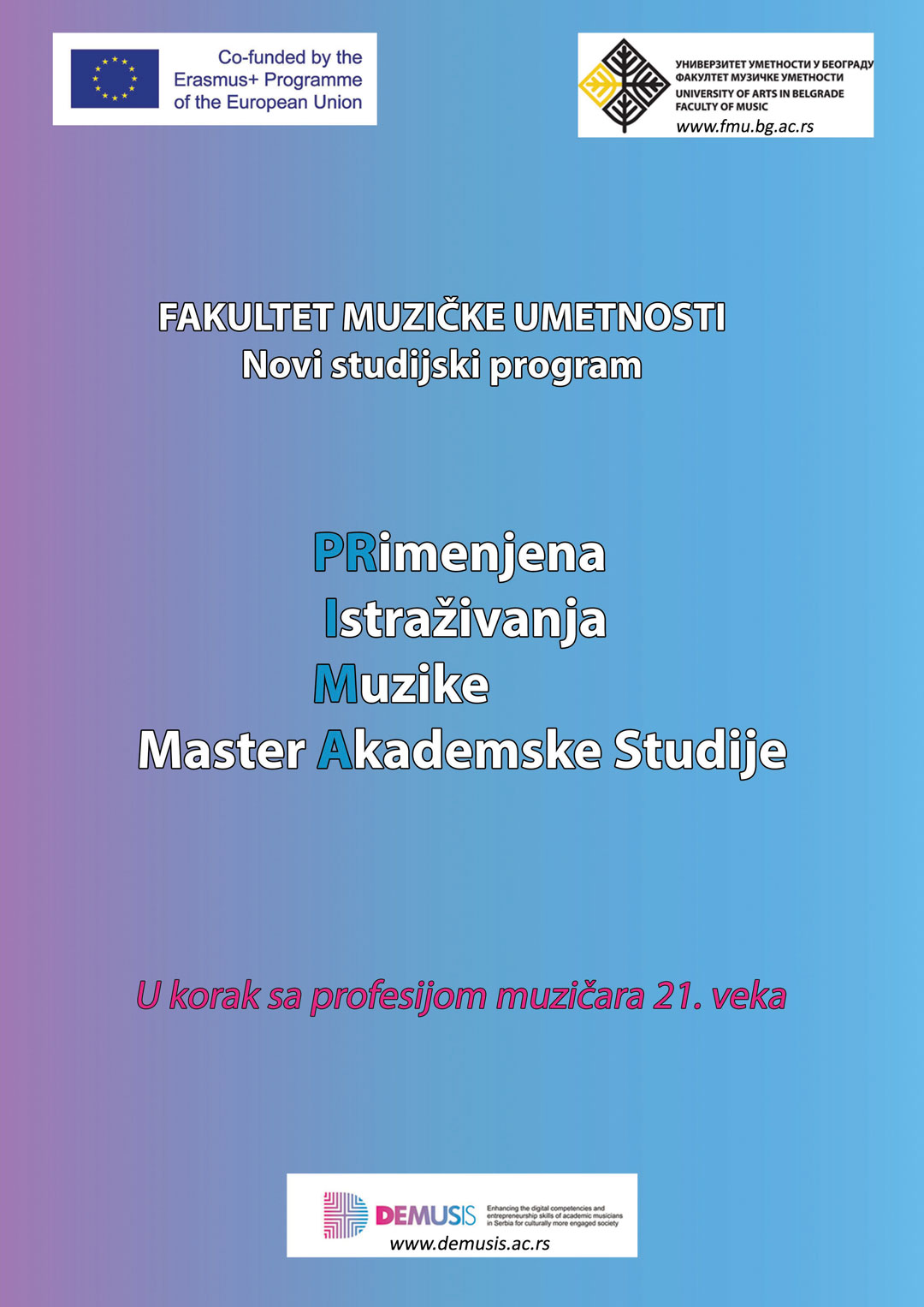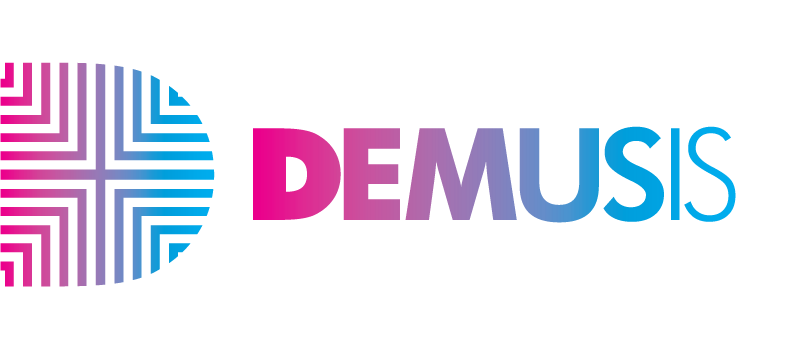The new master study program Applied Research in Music, pertaining to the field of humanities – study of music, starts at the Faculty of Music, University of Arts in Belgrade (P1) in the fall semester 2020/21.
It is the second new master academic study program developed at this Serbian HMEI within DEMUSIS project in 2019/20 and accredited by the National Entity for Accreditation and Quality Assurance in Higher Education in 2020. Previously, the study of needs was adopted by the Faculty of Music Academic Council on 04/12/19, study program approved by Academic Council on 04/02/20, adopted by University Senate on 23/04/20 and submitted for accreditation to the National Entity for Accreditation on 17/07/20.
The academic EU partner institutions – The Royal Conservatoire the Hague (P4), The New Bulgarian University (P5) and Lithuanian Academy of Music and Theatre (P6) – were strongly involved in development of the study program, with non-academic partners P7-P9 actively participating in defining student competencies and learning outcomes from stakeholder’s perspective.
The call for student applications was open on 26-27 October, entrance exam scheduled for 30 October 2020, with the studies starting in November 2020 after student enrollment.
The main objective of Applied Research in Music study program is to educate students of an innovative profile, in accordance with dynamic changes in 21st century in the field of music. The study program is conceived in a way to ensure acquirement of knowledge, competencies and skills essential for students’ inclusion in contemporary creative industries, working in both public or private, commercial or non-profit sector. Graduated students will therefore build an awareness of the importance of balance between academic research and business and commercial sector’s needs. Shaping students into music researchers of high professional level will make them competent for independent work in various kinds of applied music research, contributing in that way to arts, creative industry and culture. The study program therefore integrates application of knowledge, approaches and methods of music research from the perspective of new technologies, entrepreneurship and engaging the audience in wider social context.
The aim of the study program is to qualify students to understand and get insight into the new phenomena related to the role of music in contemporary society. Applied Research in Music study program aims to enable students to adopt and apply the most cutting-edge knowledge of entrepreneurial approach to music, socially engaged artistic/music practices and greater and more complex possibility of digital technologies, facilitate consequently better and easier realization of professional objectives by launching and marketing new ideas. Through their professional engagement, graduated students will be better connected with the community, promoting values of music and its relevance for better overall development. In that manner, students will be able to realize relevant tasks and individual projects with a mission to integrate into the society, support the diversity and increase an awareness of the importance of music in the cultural heritage. Furthermore, students will develop creative capacities for team work and independent professional work and growth.
The master academic study program Applied Research in Music objectives are completely in line with declared aims and objectives of the Faculty of Music, University of Arts in Belgrade, formed additionally in compliance with new music market demands for professionals of specific profile, positioned in various institutions within public, civil and business sector, in the field of creative industries, culture and media. Moreover, graduated students will be prepared for the new type of “portfolio” careers and new vocations, the number of which, according to experts, will greatly increase in the near future, particularly in the view of digital technologies development.
Learning outcomes are directed to students’ ability to competently recognize and apply:
- Value (economic/social/cultural) potential of music;
- Importance and potential of digital technologies relevant for music;
- Acquired knowledge and skills in thinking out, planning and realizing sustainable projects in the field of applied research in music in various context – in public, civil and business sector.
Study program outcomes include successful identification of specific target groups and building a quality and multi-level relationship with audience, using traditional or digital channels of communication, applying contemporary technologies and knowledge gained in the field of applied marketing. Students will therefore be able to put to practice skills and knowledge in the field of digital music formats in theoretical and practical music research, and to integrate it ethically and professionally into the market approach. Integration of music knowledge and its skillful implementation will be recognized in contemporary creative industry sector, strategically identified in Serbia as an important economical, innovative and scientific potential within Smart Specialization Strategy in Serbia (4S), as well as in the Entrepreneurial Discovery Process coordinated by the Ministry of education, science and technological development of the Republic of Serbia. As a result, students will, upon graduation, have a developed awareness on the importance of balance between academic research and commercial sector needs.
Based on results of entrance exam and ranking, up to 10 students can enroll to the Applied Research in Music master academic study program. Entry prerequisites include completed bachelor studies in composition/music performance/music sciences, with at least 240 ECTS obtained.
It is a one-year (two semesters) study program of 60 ECTS in total. In accordance with European tradition of studies in the field of theory of arts, about the two-quarters of ECTS come from the vocational subjects, key for the entrepreneurial approach to music and application of various digital tools in the field of music research. The electivity is elicited by the free choice of the topic for master thesis, enabling gradual development of students’ potentials, capabilities and creativity, contributing in that manner to the expansion of knowledge, innovation and processes focused on new cultural, social and economic values.
Upon completion of the studies, students acquire:
a) general competencies, including
- the ability of innovative and (self-)critical thinking in the field of applied research in music;
- the capability to put the acquired knowledge to practice by implementation and public presentation of their professional, research and interdisciplinary projects;
- communication, presentation and organizational skills along with management, team work and capacity for cooperation in both close social and international environment;
- creative approach, flexibility and adaptability to new and variable work environment;
- professional ethics, respect for diversity and social responsibility.
b) subject specific competencies, including
- analysis and synthesis of knowledge applied in the field of music, essential for professional work in contemporary environment and creative industries;
- critical analysis of changes in the chain of music creation, distribution and reception, resulting from the digital and social transformations in 21st century, along with understanding of music industry transformations;
- knowledge of modern technology, entrepreneurship and potentials of music in society;
- application of knowledge of digitization and cataloguing of traditional music and music heritage;
- implementation of knowledge of music potential in contemporary participatory culture;
- application of acquired music and scientific knowledge of music technology, music market and new channels of communication with audiences;
- work in cultural institutions, organizations and mass media, online work, as well as engagement in innovative projects in the field of applied research in music in various environments.
Study program structure can be found here
More on the study program, with detailed curriculum and list of electives can be found here (in Serbian)

